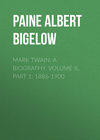Читать книгу: «The Lucky Piece: A Tale of the North Woods», страница 8
CHAPTER XI
DURING THE ABSENCE OF CONSTANCE
Yet the adventure on the mountain was not without its ill effects. It happened that day that Mr. and Mrs. Deane had taken one of their rare walks over to Spruce Lodge. They had arrived early after luncheon, and learning that Frank and Constance had not been seen there during the morning, Mrs. Deane had immediately assured herself that dire misfortune had befallen the absent ones.
The possibility of their having missed their way was the most temperate of her conclusions. She had visions of them lying maimed and dying at the foot of some fearful precipice; she pictured them being assailed by wild beasts; she imagined them tasting of some strange mushroom and instantly falling dead as a result. Fortunately, the guide who had seen Frank set out alone was absent. Had the good lady realized that Constance might be alone in a forest growing dark with a coming storm, her condition might have become even more serious.
As it was, the storm came down and held the Deanes at the Lodge for the afternoon, during which period Mr. Deane, who was not seriously disturbed by the absence of the young people, endeavored to convince his wife that it was more than likely they had gone directly to the camp and would be there when the storm was over.
The nervous mother was far from reassured, and was for setting out immediately through the rain to see. It became a trying afternoon for her comforters, and the lugubrious croaking of the small woman in black and the unflagging optimism of Miss Carroway, as the two wandered from group to group throughout the premises, gave the episode a general importance of which it was just as well that the wanderers did not know.
Yet the storm proved an obliging one to Frank and Constance, for the sun was on the mountain long before the rain had ceased below, and as they made straight for the Deane camp they arrived almost as soon as Mrs. Deane herself, who, bundled in waterproofs and supported by her husband and an obliging mountain climber, had insisted on setting out the moment the rain ceased.
It was a cruel blow not to find the missing ones at the moment of arrival, and even their prompt appearance, in full health and with no tale of misfortune, but only the big trout and a carefully prepared story of being confused in the fog but safely sheltered in the forest, did not fully restore her. She was really ill next day, and carried Constance off for a week to Lake Placid, where she could have medical attention close at hand and keep her daughter always in sight.
It began by being a lonely week for Frank, for he had been commanded by Constance not to come to Lake Placid, and to content himself with sending occasional brief letters – little more than news bulletins, in fact. Yet presently he became less forlorn. He went about with a preoccupied look that discouraged the attentions of Miss Carroway. For the most part he spent his mornings at the Lodge, in his room. Immediately after luncheon he usually went for an extended walk in the forest, sometimes bringing up at the Deane camp, where perhaps he dined with Mr. Deane, a congenial spirit, and remained for a game of cribbage, the elder man's favorite diversion. Once Frank set out to visit the hermitage, but thought better of his purpose, deciding that Constance might wish to accompany him there on her return. One afternoon he spent following a trout brook and returned with a fine creel of fish, though none so large as the monster of that first day.
Robin Farnham was absent almost continuously during this period, and Edith Morrison Frank seldom saw, for the last weeks in August brought the height of the season, and the girl's duties were many and imperative. There came no opportunity for the talk he had meant to have with her, and as she appeared always pleasant of manner, only a little thoughtful – and this seemed natural with her responsibilities – he believed that, like himself, she had arrived at a happier frame of mind.
And certainly the young man was changed. There was a new light in his eyes, and it somehow spoke a renewed purpose in his heart. Even his step and carriage were different. When he went swinging through the forest alone it was with his head thrown back, and sometimes with his arms outspread he whistled and sang to the marvelous greenery above and about him. And he could sing. Perhaps his was not a voice that would win fame or fortune for its possessor, but there was in it a note of ecstasy which answered back to the call of the birds, to the shout or moan of the wind, to every note of the forest – that was, in fact, a tone in the deep chord of nature, a lilt in the harmony of the universe.
He forgot that his soul had ever been asleep. A sort of child frenzy for the mountains, such as Constance had echoed to him that wild day in March, grew upon him and possessed him, and he did not pause to remember that it ever had been otherwise. When the storm came down from the peaks, he strode out into it, and shouted his joy in its companionship, and raced with the wind, and threw himself face down in the wet leaves to smell the ground. And was it no more than the happiness of a lover who believes himself beloved that had wrought this change, or was there in this renewal of the mad joy of living the reopening and the flow of some deep and half-forgotten spring?
From that day on the mountain he had not been the same. That morning with its new resolve; the following of the brook which had led him back to boyhood; the capture of the great trout; the battle with the mountain and the mist; the meeting with Constance at the top; the hermit's cabin with its story of self-denial and abnegation – its life so close to the very heart of nature, so far from idle pleasure and luxury – with that eventful day had come the change.
In his letters to Constance, Frank did not speak of these things. He wrote of his walks, it is true, and he told her of his day's fishing – also of his visits to her father at the camp – but of any change or regeneration in himself, any renewal of old dreams and effort, he spoke not at all.
The week lengthened before Constance returned, though it was clear from her letters that she was disinclined to linger at a big conventional hotel, when so much of the summer was slipping away in her beloved forest. From day to day they had expected to leave, she wrote, but as Mrs. Deane had persuaded herself that the Lake Placid practitioner had acquired some new and subtle understanding of nerve disorders, they were loath to hurry. The young lady ventured a suggestion that Mr. Weatherby was taking vast comfort in his freedom from the duties and responsibilities of accompanying a mushroom enthusiast in her daily rambles, especially a very exacting young person, with a predilection for trying new kinds upon him, and for seeking strange and semi-mythical specimens, peculiar to hazy and lofty altitudes.
"I am really afraid I shall have to restrain my enthusiasm," she wrote in one of these letters. "I am almost certain that Mamma's improvement and desire to linger here are largely due to her conviction that so long as I am here you are safe from the baleful Amanita, not to mention myself. Besides, it is a little risky, sometimes, and one has to know a very great deal to be certain. I have had a lot of time to study the book here, and have attended a few lectures on the subject. Among other things I have learned that certain Amanitas are not poison, even when they have the cup. One in particular that I thought deadly is not only harmless, but a delicacy which the Romans called 'Cæsar's mushroom,' and of which one old epicure wrote, 'Keep your corn, O Libya – unyoke your oxen, provided only you send us mushrooms.'" She went on to set down the technical description from the text-book and a simple rule for distinguishing the varieties, adding, "I don't suppose you will gather any before my return – you would hardly risk such a thing without my superior counsel – but should you do so, keep the rule in mind. It is taken word for word from the book, so if anything happens to you while I am gone, either you or the book will be to blame – not I. When I come back – if I ever do – I mean to try at least a sample of that epicurean delight, which one old authority called 'food of the gods,' provided I can find any of them growing outside of that gruesome 'Devil's Garden.'"
Frank gave no especial attention to this portion of her letter. His interest in mushrooms was confined chiefly to the days when Constance could be there to expatiate on them in person.
In another letter she referred to their adventure on the mountain, and to the fact that Frank would be likely to see Robin before her return.
"You may tell Robin Farnham," she said, "about our visit to the hermit, and of the message he sent. Robin may be going in that direction very soon, and find time to stop there. Of course you will be careful not to let anything slip about the tale he told us. I am sure it would make no difference, but I know you will agree with me that his wishes should be sacred. Dear me, what a day that was, and how I did love that wonderful house! Here, among all these people, in this big modern hotel, it seems that it must have been all really enchantment. Perhaps you and Robin could make a trip up there together. I know, if there truly is a hermit, he will be glad to see you again. I wonder if he would like to see me again. I brought up all those sad memories. Poor old man! My sympathy for him is deeper than you can guess."
It happened that Robin returned to the Lodge that same afternoon. A little later Frank found him in the guide's cabin, and recounted to him his recent adventures with Constance on the mountain – how they had wandered at last to the hermitage, adding the message which their host had sent to Robin himself.
The guide listened reflectively, as was his habit. Then he said:
"It seems curious that you should have been lost up there, just as I was once, and that you should have drifted to the same place. You took a little different path from mine. I followed the chasm to the end, while you crossed on the two logs which the old fellow and I put there afterward to save me time. I usually have to make short visits, because few parties care to stay on McIntyre over night, and it's only now and then that I can get away at all. I have been thinking about the old chap a good deal lately, but I'm afraid it would mean a special trip just now, and it would be hard to find a day for that."
"I will arrange it," said Frank. "In fact, I have already done so. I spoke to Morrison this morning, and engaged you for a day as soon as you got in. I want to make another trip up the mountain, myself. We'll go to-morrow morning – directly to the cabin – and I'll see that you have plenty of time for a good visit. What I want most is another look around the place itself and its surroundings. I may want to construct a place like that some day – in imagination, at least."
So it was arranged that the young men should visit the hermitage together. They set out early next morning, following the McIntyre trail to the point below the little fall where the hermit had bidden good-by to mankind so many years before. Here they turned aside and ascended the cliff by the hidden path, presently reaching the secluded and isolated spot where the lonely, stricken man had established his domain.
As they drew near the curious dwelling, which because of its construction was scarcely noticeable until they were immediately upon it, they spoke in lowered voices, and presently not at all. It seemed to them, too, that there was a hush about the spot which they had not noticed elsewhere. Frank recalled the chorus of birds which had filled the little garden with song, and wondered at their apparent absence now. The sun was bright, the sky above was glorious, the gay posies along the garden paths were as brilliant as before, but so far as he could see and hear, the hermit's small neighbors and companions had vanished.
"There is a sort of Sunday quiet about it," whispered Frank. "Perhaps the old fellow is out for a ramble, and has taken his friends with him." Then he added, "I'll wait here while you go in. If he's there, stay and have your talk with him while I wander about the place a little. Later, if he doesn't mind, I will come in."
Frank directed his steps toward the little garden and let his eyes wander up and down among the beds which the hermit had planted. It was late summer now, and many of the things were already ripening. In a little more the blackening frost would come and the heavy snow drift in. What a strange life it had been there, winter and summer, with only nature and a pageantry of dreams for companionship. There must have been days when, like the Lady of Shalott, he had cried out, "I am sick of shadows!" and it may have been on such days that he had watched by the trail to hear and perhaps to see real men and women. And when the helplessness of very old age should come – what then? Within his mind Frank had a half-formed plan to persuade the hermit to return to the companionship of men. There were many retreats now in these hills – places where every comfort and the highest medical skill could be obtained for patients such as he. Frank had conceived the idea of providing for the hermit's final days in some such home, and he had partly confided his plan to Robin as they had followed the trail together. Robin, if anybody, could win the old fellow to the idea.
There came the sound of a step on the path behind. The young man, turning, faced Robin. There was something in the latter's countenance that caused Frank to regard him searchingly.
"He is not there, then?"
"No, he is not there."
"He will be back soon, of course."
But Robin shook his head, and said with gentle gravity:
"No, he will not be back. He has journeyed to a far country."
Together they passed under the low eaves and entered the curious dwelling. Light came through the open door and the parchment-covered window. In the high-backed chair before the hearth the hermit sat, his chin dropped forward on his breast. His years of exile were ended. All the heart-yearning and loneliness had slipped away. He had become one with the shadows among which he had dwelt so long.
Nor was there any other life in the room. As the birds outside had vanished, so the flitting squirrels had departed – who shall say whither? Yet the change had come but recently – perhaps on that very morning – for though the fire had dropped to ashes on the hearth, a tiny wraith of smoke still lingered and drifted waveringly up the chimney.
The intruders moved softly about the room without speaking. Presently Frank beckoned to Robin, and pointed to something lying on the table. It was a birch-bark envelope, and in a dark ink, doubtless made from some root or berry, was addressed to Robin. The guide opened it and, taking it to the door, read:
My Dear Boy Robin:
I have felt of late that my time is very near. It is likely that I shall see you no more in this world. It is my desire, therefore, to set down my wishes here while I yet have strength. They are but few, for a life like mine leaves not many desires behind it.
It is my wish that such of my belongings as you care to preserve should be yours. They are of little value, but perhaps the field glass and the books may in future years recall the story in which they have been a part. In a little chest you will find some other trifles – a picture or two, some papers that were once valuable to those living in the world of men, some old letters. All that is there, all that is mine and all the affection that lingers in my heart, are yours. Yet I must not forget the little girl who was once your sister. If it chance that you meet her again, and if when she knows my story she will care for any memento of this lonely life, you may place some trifle in her hands.
It was my story that I had chiefly meant to set down for you, for it is nearer to your own than you suppose. But now, only a few days since, out of my heart I gave it to those who were here and who, perhaps, ere this, have given you my message to come. A young man and a woman they were, and their happiness together led me to speak of old days and of a happiness that was mine. The girl's face stirred me strangely, and I spoke to her fully, as I have long wished, yet feared, to speak to you. You will show her this letter, and she will repeat to you all the tale which I no longer have strength to write. Then you will understand why I have been drawn to you so strangely; why I have called you "my dear boy"; why I would that I might call you "son."
There is no more – only, when you shall find me here asleep, make me a bed in the corner of my garden, where the hollyhocks come each year, and the squirrels frisk overhead, and the birds sing. Lay me not too deeply away from it all, and cover me only with boughs and the cool, gratifying earth which shall soothe away the fever. And bring no stone to mark the place, but only breathe a little word of prayer and leave me in the comfortable dark.
Neither Robin nor Frank spoke for a time after the reading of the letter. Then faithfully and with a few words they carried out the hermit's wishes. Tenderly and gently they bore him to the narrow resting-place which they prepared for him, and when the task was finished they stood above the spot for a little space with bowed heads. After this they returned to the cabin and gathered up such articles of Robin's inheritance as they would be able to carry down the mountain – the books and field glass, which had been so much to him; the gun above the mantel, a trout rod and a package of articles from the little chest which they had brought to the door and opened. At the top of the package was a small, cheap ferrotype picture, such as young people are wont to have made at the traveling photographer's. It was of a sweet-faced, merry-lipped girl, and Robin scanned it long and thoughtfully.
"That is such a face as my mother had when young," he said at last. Then turning to Frank, "Did he know my mother? Is that the story?"
Frank bent his head in assent.
"That is the story," he said, "but it is long. Besides, it is his wish, I am sure, that another should tell it to you."
He had taken from the chest some folded official-looking papers as he spoke, and glanced at them now, first hastily, then with growing interest. They were a quantity of registered bonds – the hermit's fortune, which in a few brief days had become, as he said, but a mockery of scrolled engraving and gaudy seals. Frank had only a slight knowledge of such matters, yet he wondered if by any possibility these old securities of a shipwrecked company might be of value to-day. The corporation title, he thought, had a familiar sound. A vague impression grew upon him that this company had been one of the few to be rehabilitated with time; that in some measure at least it had made good its obligations.
"Suppose you let me take these," he suggested to Robin. "They may not be wholly worthless. At least, it will do no harm to send them to my solicitor."
Robin nodded. He was still regarding the little tintype and the sweet, young face of the mother who had died so long ago.
CHAPTER XII
CONSTANCE RETURNS AND HEARS A STORY
"I only told him," Frank wrote that night to Constance, "that the hermit's story had a part in his mother's life. I suppose I might have told him more, but he seemed quite willing to wait and hear it from you, as suggested by the hermit's letter, and I was only too willing that he should do so. Knowing Robin, as you have, from childhood, and the sorrow of his early days and all, you are much better fitted to tell the story, and you will tell it much better than I. Robin is to leave again to-morrow on a trip over Marcy (Tahawus, I mean, for I hate these modern names), but will be back by the end of the week, by which time I hope you also will once more make glad these lonesome forest glades. Seriously, Conny, I long for you much more than perhaps you realize or, I am sure, would permit me to say. And I don't mean to write a love letter now. In the first place, I would not disobey orders to that degree, and even if I did, I know that you would say that it was only because poor old Robin Gray's story and his death, and all, and perhaps wandering about in these woods alone, had made me a bit sentimental. Well, who knows just whence and how emotions come? Perhaps you would be right, but if I should tell you that, during the two weeks which have nearly slipped by since that day when we found our way through the mist to the hermit's cabin, my whole point of view has somehow changed, and that, whatever the reasons, I see with different eyes – with a new heart and with an uplifted spirit – perhaps I should be right, too; and if from such a consecration my soul should speak and say, 'Dear, my heart, I love you, and I will love you all my days!' it may be that you would believe and understand."
Whether it was this letter, or the news it contained, or whether Mrs. Deane's improved condition warranted – from whatever reason, Constance and her mother two days later returned to the camp on the Au Sable. They were given a genuine ovation as they passed the Lodge, at which point Mr. Deane joined them. Frank found his heart in a very disturbing condition indeed as he looked once more into Miss Deane's eyes and took her hand in welcome. Later in the day, he deemed it necessary to take a walk in the direction of the camp to see if he could be of any assistance in making the new arrivals comfortable. It was a matter of course that he should remain for dinner, and whatever change may have taken place in him, he certainly appeared on this occasion much like the old light-hearted youth, with little thought beyond the joy of the event and the jest of the moment.
But that night, when he parted from Constance to take the dark trail home, he did not find it easy to go, nor yet to make an excuse for lingering. The mantle of gayety had somehow slipped away, and as they stood there in the fragrance of the firs, with the sound of falling water coming through the trees, the words he had meant to utter did not come.
He spoke at last of their day together on the mountain and of their visit to the hermit's cabin. To both of them it seemed something of a very long time ago. Then Frank recounted in detail all that had happened that quiet morning when he and Robin had visited the place, and spoke of the letter and last wishes of the dead man.
"You are sure you do not mind letting me tell Robin the story?" she said; "alone, I mean? I should like to do so, and I think he would prefer it."
Frank looked at her through the dusk.
"I want you to do it that way," he said earnestly. "I told you so in my letter. I have a feeling that any third person would be an intruder at such a time. It seems to me that you are the only one to tell him."
"Yes," she agreed, after a pause, "I am. I – knew Robin's mother. I was a little girl, but I remember. Oh, you will understand it all, some day."
Frank may have wondered vaguely why she put it in that way, but he made no comment. His hand found hers in the dusk, and he held it for a moment at parting.
"That is a dark way I am going," he said, looking down the trail. "But I shall not even remember the darkness, now that you are here again."
Constance laughed softly.
"Perhaps it is my halo that makes the difference."
A moment later he had turned to go, but paused to say – casually, it seemed:
"By the way, I have a story to read to you – a manuscript. It was written by some one I know, who had a copy mailed me. It came this morning. I am sure the author, whose name is to be withheld for the present, would appreciate your opinion."
"And my judgment is to be final, of course. Very well; Minerva holds her court at ten to-morrow, at the top of yon small mountain, which on the one side slopes to the lake, and on the other overlooks the pleasant Valley of Decision, which borders the West Branch."
"And do I meet Minerva on the mountain top, or do I call for her at the usual address – that is to say, here?"
"You may call for Minerva. After her recent period of inactivity she may need assistance over the hard places."
Frank did, in fact, arrive at the camp next morning almost in time for breakfast. Perhaps the habit of early rising had grown upon him of late. Perhaps he only wished to assure himself that Constance had really returned. Even a wish to hear her opinion of the manuscript may have exerted a certain influence.
They set out presently, followed by numerous injunctions from Mrs. Deane concerning fogs and trails and an early return. Frank had never ascended this steep little mountain back of the camp, save once by a trail that started from near the Lodge. He let Constance take the lead.
It was a rare morning – one of the first September days, when the early blaze of autumn begins to kindle along the hills, when there is just a spice of frost in the air, when the air and sunlight combine in a tonic that lifts the heart, the soul, almost the body itself, from the material earth.
"If you are Minerva, then I am Mercury," Frank declared as they ascended the first rise. "I feel that my feet have wings."
Then suddenly he paused, for they had come to a little enclosure, where the bushes had been but recently cleared away. There was a gate, and within a small grave, evidently that of a child; also a headstone upon which was cut the single word, "Constance."
Frank started a little as he read the name, and regarded it wonderingly without speaking. Then he turned to his companion with inquiry in his face.
"That was the first little Constance," she said. "I took her place and name. She always loved this spot, so when she died they laid her here. They expected to come back sooner. Her mother wanted just the name on the stone."
Frank had a strange feeling as he regarded the little grave.
"I never knew that you had lost a sister," he said. "I mean that your parents had buried a little girl. Of course, she died before you were born."
"No," she said, "but her death was a fearful blow. Mamma can hardly speak of it even to-day. She could never confess that her little girl was dead, so they called me by her name. I cannot explain it all now."
Frank said musingly:
"I remember your saying once that you were not even what you seemed to be. Is this what you meant?"
She nodded.
"Yes; that is what I meant."
They pushed on up the hill, without many words.
The little enclosure and the graven stone had made them thoughtful. Arriving at the peak they found, at the brow of a cliff, a broad, shelving stone which hung out over a deep, wooded hollow, where here and there the red and gold were beginning to gleam. From it they could look across toward Algonquin, where they tried to locate the spot of the hermit's cabin, and down upon the lake and the Lodge, which seemed to lie almost at their feet.
At first they merely rested and drank in the glory of the view. Then at last Frank drew from his pocket a folded typewritten paper.
"If the court of Minerva is convened, I will lay this matter before her," he said.
It was not a story of startling theme that he read to her – "The Victory of Defeat"; it was only a tale of a man's love, devotion and sacrifice, but it was told so simply, with so little attempt to make it seem a story, that one listening forgot that it was not indeed a true relation, that the people were not living and loving and suffering toward a surrender which rose to triumph with the final page. Once only Constance interrupted, to say:
"Your friend is fortunate to have so good a reader to interpret his story. I did not know you had that quality in your voice."
He did not reply, and when he had finished reading and laid the manuscript down he waited for her comment. It was rather unexpected.
"You must be very fond of the one who wrote that," she said.
He looked at her quickly, hardly sure of her meaning. Then he smiled.
"I am. Almost too much so, perhaps."
"But why? I think I could love the man who did that story."
An expression half quizzical, half gratified, flitted across Frank's features.
"And if it were written by a woman?" he said.
Constance did not reply, and the tender look in her face grew a little cold. A tiny bit of something which she did not recognize suddenly germinated in her heart. It was hardly envy – she would have scorned to call it jealousy. She rose – rather hastily, it seemed.
"Which perhaps accounts for your having read it so well," she said. "I did not realize, and – I suppose such a story might be written by almost any woman except myself."
Frank caught up the manuscript and poised it like a missile.
"Another word and it goes over the cliff," he threatened.
She caught back his arm, laughing naturally enough.
"It is ourselves that must be going over the cliff," she declared. "I am sure Mamma is worrying about us already."
Покупайте книги и получайте бонусы в Литрес, Читай-городе и Буквоеде.
Участвовать в бонусной программе




















